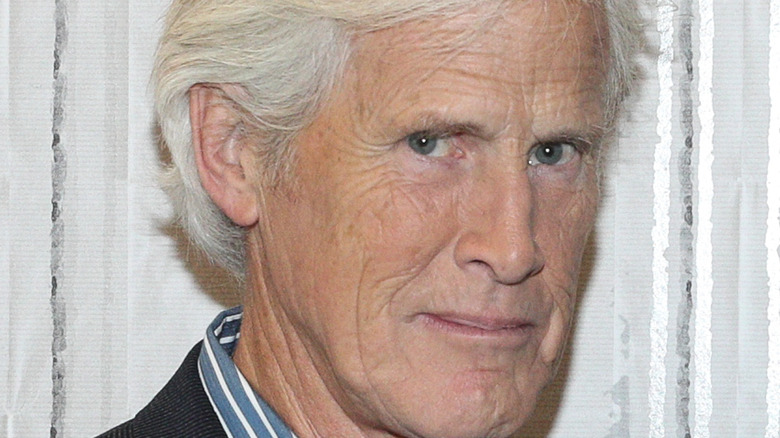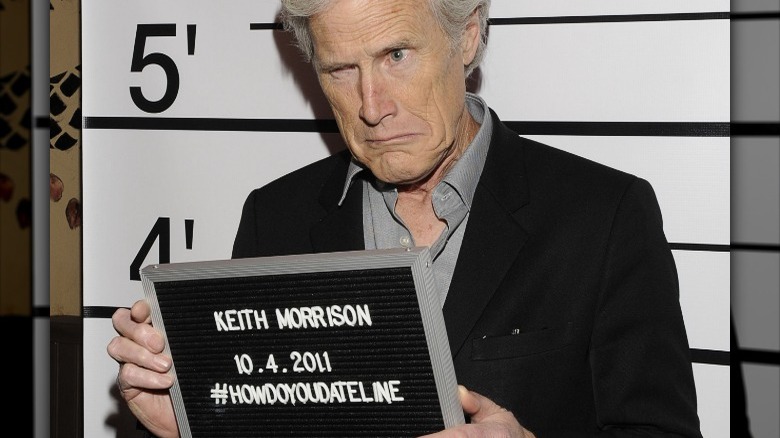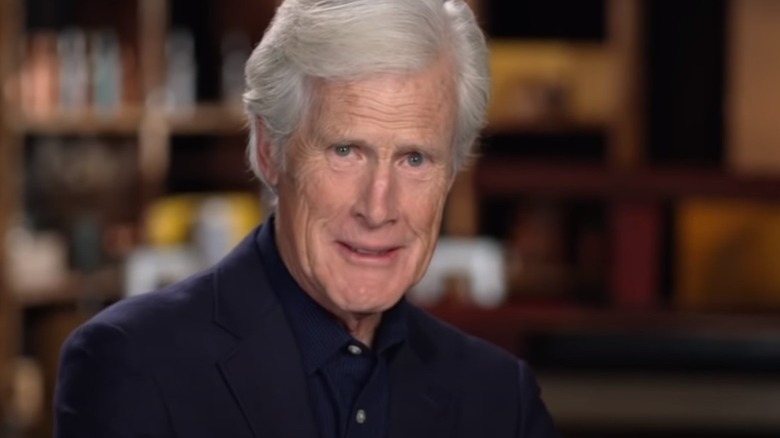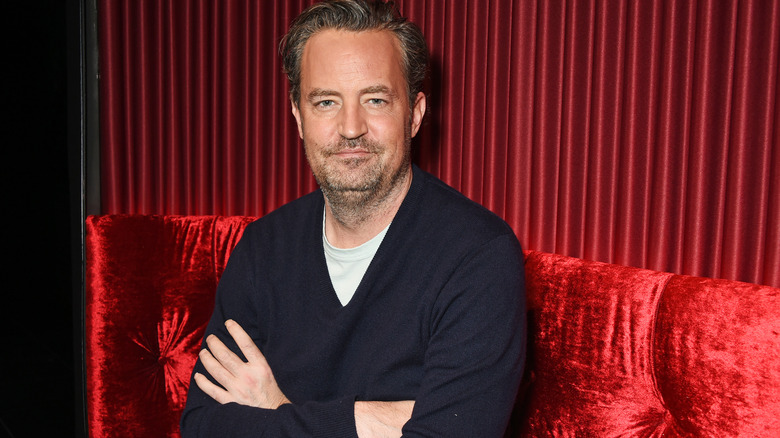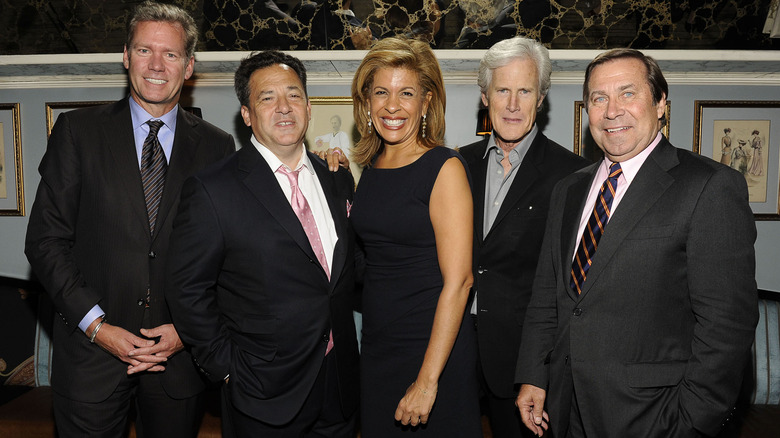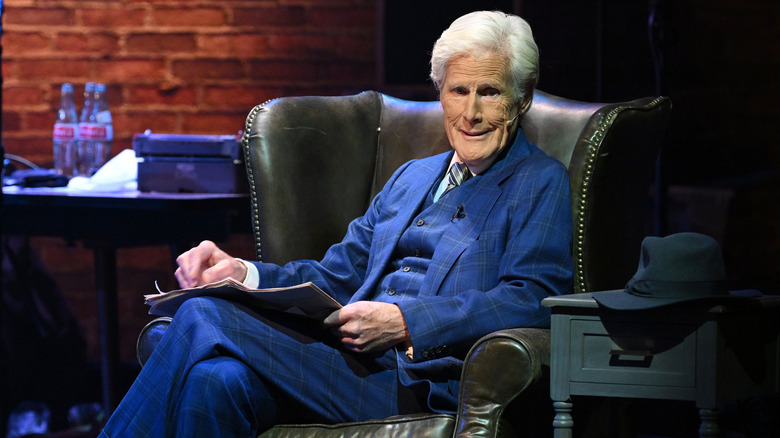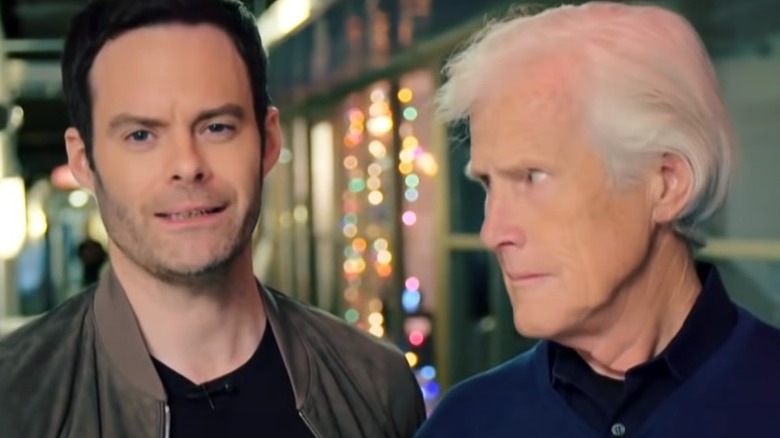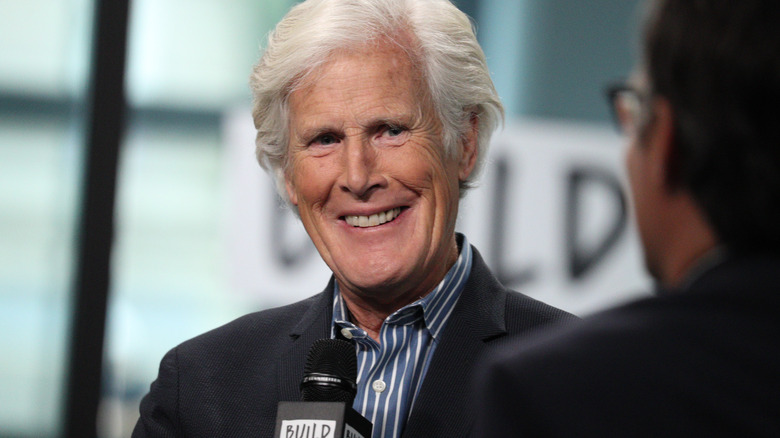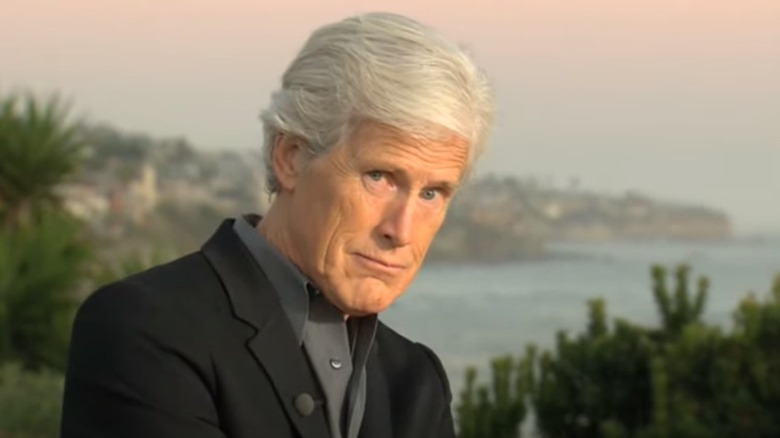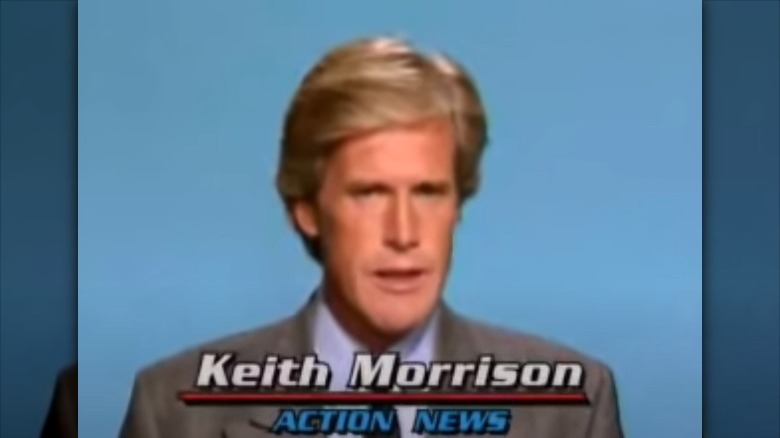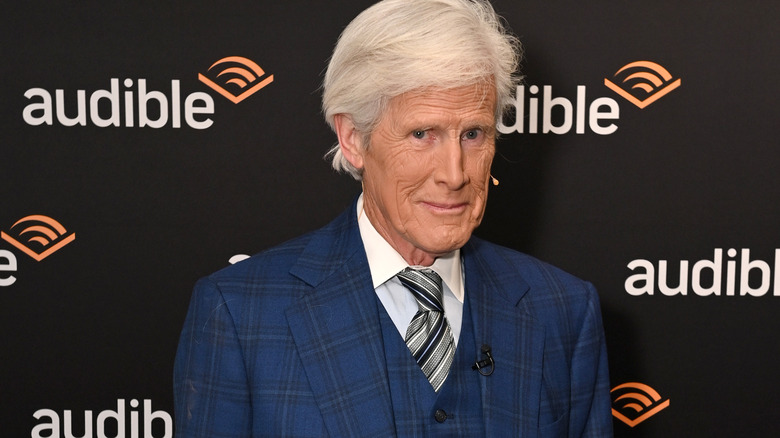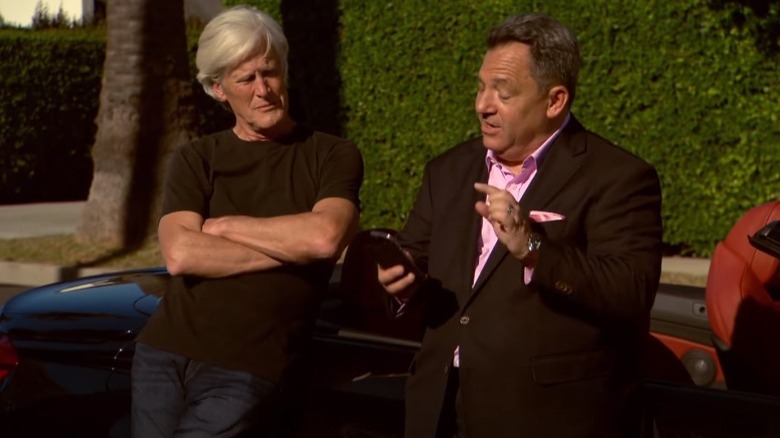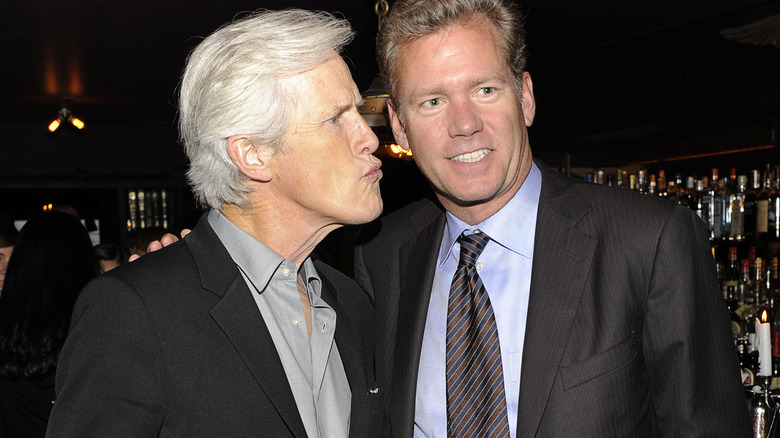Behind-The-Scenes Facts About Dateline's Keith Morrison
When The New York Times took a look at the phenomenon of why we can't get enough of crime, it was 2021, and the flagship of true crime shows — "Dateline" — had been on for three decades. In other words, it essentially raised an entire generation of true crime buffs.
Countless people have been lured into the show's mystery, intrigue, and mayhem of stories so dark they just have to be true, and many tune in again and again because of the dulcet tones of Keith Morrison. Morrison brings something almost inexplicable to the screen and to the genre, and it's something important: The reminder that victims are going through the worst moments of their lives, and should be respected above all.
Morrison gave some insight to the Times, saying, "The main advice would be not to forget that these are human beings at the heart of this. ... Somebody who has done a bad thing ... you know they were probably just like you or me, a regular person, up until that moment when suddenly, they weren't. ... if you're in the business of covering stories about these things, ... be respectful of the people involved." It's a powerful message — so let's go behind the scenes and see what else we can glean from the investigative journalist, television personality, storyteller, and yes, therapist, who is Keith Morrison.
He definitely didn't always have this career path in mind
While it might seem like Keith Morrison was literally born to be the true crime guru of "Dateline," that absolutely wasn't the case. Morrison is the son of a minister and a music teacher, and told GQ that he had originally planned on becoming a lawyer. As unlikely as it might seem, he says that he couldn't keep out of his own way, and his tendency to get into trouble put an end to that career path.
He was 20 years old when (with his father's guidance), he looked into becoming a minister. He went as far as to fill in for a regular minister in a small Saskatchewan town, but when he found himself speaking to a woman after the death of her husband, he knew it wasn't for him: "It was one of those unforgettable moments when you understand this is real, and you better shape up and grow up. ... That was probably the moment I realized I shouldn't do this."
After he began running errands for a neighbor who happened to be a newspaper editor, he got into journalism — but he almost dropped out of that, too. He told The New York Times that the make-or-break moment was when he was sent to interview a woman after her husband had been hit by a car and killed. He said it was "the last thing in the world I wanted to do," but he did it.
The same moment starts every story
Producer Vincent Sturla has worked with Keith Morrison for a long, long time, and explained to GQ: "He has a great deal of empathy for people ... He's very sincere, ... kind of like the Mr. Rogers of murder." Fans will likely find that an apt description, and there's a good reason for that: He initially had no desire to get into the genre for a very legit reason. Morrison recalled, "I thought it was kind of tabloid-y. I felt it took advantage of people's pain."
Perhaps surprisingly, that feeling hasn't entirely gone away. Morrison has said that whenever he starts a new story, it still nags at him. "This is somebody's ... the most painful thing that could ever happen to them. ... It gives you a few moments of, 'Should we really be doing this?'"
In the end, though, that's precisely the sort of attitude that has not only kept him on the air for decades and earned him legions of fans, but what keeps families going to him and choosing to open up about the darkest time of their lives. Morrison describes the process as cathartic for people who are struggling to process the horrors that have happened, and strangely, he's also said (via People) that getting emotionally involved with a story is what makes him — by many definitions — a complete failure as a journalist. Journalists are, after all, supposed to remain impartial, and Morrison adds that if empathy is a weakness, "I'll live with it."
He had an apparently complicated relationship with his famous stepson
Keith Morrison was still an up-and-coming reporter at CTV National News when he met then-Prime Minister Pierre Trudeau and his press secretary, Suzanne Perry. Perry and Morrison would go on to marry, and their family would include four children together, as well as Perry's son from a previous relationship (via GQ).
That ended up being Matthew Perry of the "Friends" fame, and Morrison has spoken out about his famous stepson in several interviews. Each time, he has nothing but nice things to say, telling People, "He's an intense, talented, focused character. He's very bright. That was always the case as he was growing up. ... He's a good guy."
Morrison revealed in a conversation with Today that, yes, he had visited the set of "Friends," and added that Perry had gifted him a Porsche 911. That might suggest a close-knit family, but when Perry's memoir came out in 2022, there was enough in there to suggest that things weren't always stress-free. Perry wrote (via The Washington Post) that he had seen his childhood as a relentless battle with Morrison. Over what? The attention of his mother, so it turns out. And while Perry did refer to his relationship with his stepfather with something of a reserved sort of affection, he also called him "Keith Morrison" throughout conversations about him.
He considers this interview one of the most extraordinary
Keith Morrison has done countless interviews and worked on decades' worth of stories: So, are there ones that stick with him? Absolutely, and he told People, "You'd be amazed how often I find myself musing on stories I may have done 25 years ago." But what about specifics? For that, look no further than an interview Morrison did with Vanity Fair, introducing his podcast series.
Morrison recalled a 2010 interview with Jaime Ramos (via NBC), and it started with Ramos sharing his mother's suicide, his father's arrest, and ten years of sexual assaults carried out by his uncle. Ramos was 21 when he got involved with Patty Presba, who was both married and more than two decades his senior. He recounted how — under her guidance — he had killed her husband and burned his body in a staged car accident, confessing the crime at the urging of his grandmother. Originally a "Dateline" television episode, Morrison said that when it came time to develop a podcast, he knew this was a story he wanted to feature.
His conversation with Ramos ran four hours — much longer than the usual interview. He recalled: "People lie to you all the time in these interviews ... it's self-serving the way they tell a story, but not in this case. ... He didn't hold back. He didn't try to avoid blaming himself. He didn't try to push blame onto anybody else. It was extraordinary."
He uses this mindset to get the interview
Perhaps unsurprisingly, there's a lot of prep work that goes into a case long before Keith Morrison sits down to interview anyone. When Buzzfeed News talked to some of the behind-the-scenes people who make "Dateline" happen, producer Carol Gable shared a fascinating tidbit about Morrison's process. The first time she worked with him, she had compiled a massive tome of information about the case they were going to be working on. When it came time to head out for the five-day trip, she recalled that he showed up with an overnight bag ... and that was it. It wasn't until later that she realized there was a very good reason for that: He'd read the file in its entirety, and remembered it all. She went on to call him "one of the best-prepared correspondents I've ever worked with," but according to Morrison himself, there's a little more to the story.
He says that while he relies heavily on his team to put together a briefing that guarantees he's walking into an interview well prepared, he told Today that part of his job involved telling himself, "You don't know anything."
"Our job is to listen," he said. "I'm there to hear and to learn ... the story is their story. And one way or another it'll fit into a package of many interviews, which will tell, I hope, something close to the real truth of the matter."
What does he really think of Bill Hader's SNL impression of him?
It could be argued that there are two ways to know someone's made it: They're featured as a caricature of themselves on "Saturday Night Live," or they're parodied by Weird Al. For Keith Morrison, he was famously portrayed on "SNL" by Bill Hader, who — in a 2019 interview with Today — said that he was not only a massive "Dateline" fan, but admitted that he'd never met Morrison before.
They, of course, already knew all that, so when they took Hader into the "Dateline" editing booth to reportedly get a few voiceover pickups from Morrison, Hader was like a kid in a candy shop. And, when Morrison walked in the door, he literally squealed with delight. When Morrison was asked what he thought of his "SNL" counterpart, he joked that it had probably tacked a few extra years onto his career. He went on to explain that his daughter had called him to tell him that he was on "SNL," and after watching it, he said, "It was very weird, I gotta tell you!"
Hader attempted to explain how the whole thing came about, which ended with, "I'm so nervous right now!" He shouldn't have been: Morrison flew from Los Angeles to New York just to meet him, and if that's not a seriously wholesome vote of confidence, nothing is.
Do interviews get honestly terrifying?
Keith Morrison has interviewed people who have done horrible, terrible things, and is that intimidating? According to what he told Vanity Fair, not really.
Part of the reason for that, he explains, is that the most dangerous — and most obviously guilty — people are the nicest in interviews, because they think they're the smartest, most charming person in the room. To them, it's often their time to convince everyone of their innocence. They're also there because they want to be — no one is blindsided by it, and no one is told that they need to be interviewed. Morrison explained, "I want to hear the story. I want to hear what their explanation is. And it's always fascinating, no matter how bad they may be."
Morrison was asked an adjacent question on his IAmA Reddit, by someone wondering if he'd ever been outraged by an interview subject, to the point where he'd considered hitting them. While he responded, "No, but a couple of attorneys have come close," he also said that there were some interviewees that he didn't entirely know how to respond to. In particular, he called out a preacher who had killed and dismembered his wife, but still believed they would be reunited in heaven, adding: "Didn't know whether to laugh or cry at that one."
This is the true crime trend he finds most disturbing
In his time as a journalist, Keith Morrison has interviewed all kinds of people about all kinds of crimes. According to what he told The Wrap, he finds them all equally interesting, and described them all as a "look at humanity, raw."
At the time, he'd been in the business for 50 years — give or take a few months — and he did give some terrifying insight into what he'd seen over the years. He said that while there wasn't much that surprised him anymore, he was more troubled by the patterns that he had seen play out over and over again — and, he added, he considered himself fortunate enough to be able to bring those patterns to light, saying, "One, for example, is the disturbing repetition of the relationship between a man and a woman where a young woman will find herself drawn into a controlling relationship with a man who she believes she must be in love with. Then, ... she winds up dead. That's one that we've done frequently. It's disturbing."
Morrison mentioned the trend to Vanity Fair, saying that he'd seen the same thing many, many times. He added some advice, too: "Find a way to run without him knowing you're leaving ASAP. If you let him know you're leaving, and then it's going to be dangerous for a while."
He gets a hilarious royalty check every month
When it comes to television juggernauts, "Seinfeld" has been up there since it first debuted. The four main stars — along with co-creator Larry David — were making big bucks, and according to Vulture's 2014 breakdown of what had become a billion-dollar empire, Jerry Seinfeld and David have most recently been raking in about $400 million per year in royalties.
That's a mind-blowing amount of money, and hilariously, Keith Morrison is getting a share of those profits, too.
Morrison was in a Season 4 episode called "The Trip" (per IMDB), when he reported on the escape of a suspect in the so-called Smog Strangler case ... which, of course, happened after Jerry and George left the back door of a police car open. Morrison told The Wrap that he sort of accidentally ended up on the show, and just happened to not be working when he got a phone call asking if he'd read a small part for "Seinfeld." He went over to the set, said Seinfeld himself was a pretty nice guy, and "I was there maybe 20 minutes, half an hour, and I got back in the car and forgot all about it. ... My little tiny part, I get a check for like $5 practically every month."
He has a deeply philosophical side
Everyone has that list of famous people that they'd like to meet, and Keith Morrison is no different. In 2020, he participated in the interview series "7 Questions with Emmy," in which the daughter of Idaho news director Nate Eaton asks the tough questions (via KSL). (For the record, Morrison is a chocolate chip cookie kind of guy.) She asked him who he would want to interview, and he responded that at the top of his list were the Dalai Lama and the Pope: "people who think about things a lot," as he described them.
Morrison told Vanity Fair that he's long been fascinated by the philosophical questions that surround death and — by extension — how they apply to situations where that death is premature.
He explained that if there was one thing that he had learned from his work as a journalist, it's that death impacts the world in much the same way as a stone thrown into a calm pool, stating: "If there's any unifying factor in death, the way I see it, it's the harm that it causes among the living after an incident like this occurs. Waves of brutalized change that occur in lives that can stretch over generations. The murderer doesn't kill one person. The murderer creates horrible damage all around."
Why does he lean on everything, anyway?
Even casual viewers of "Dateline" will start to notice something particular after watching a few of Keith Morrison's episodes. Namely, his tendency to lean on things.
The Wrap asked him about it, and while he initially denied knowing how it started, he finally admitted that there actually was something to it. It started, he said, because he hated doing a kind of reporting called "standups." That's basically when the reporter or journalist is talking into the camera, and it's easy to see how that could be uncomfortable. Finding a position, something to do with the hands, something to make it look anything but unnatural can be a challenge, and Morrison said that many times, it's why reporters have a tendency to walk when they're setting up a story.
Him? He leans, saying, "Whenever I've had to do a standup, I figured the best thing to do, is to look relaxed and not look too excitable on camera, so I just lean on something. It just became a thing."
Here's Keith Morrison's advice on staying positive
From sifting through crime scene photos to reading about some of the nation's most gruesome crimes to interviewing suspects — and those who had their lives ruined — there's no denying that Keith Morrison's job is ridiculously stressful. So, how does he step away from that and keep it from taking over his entire life?
He talked to Today about precisely that, saying there were some things that kept him going — starting with the statistics. "The fact of the matter is that in the years that true crimes have been such a popular genre on American television ... the crime rate in America has gone way down. There are far fewer murders than there once were," he explained.
He also said that one of the most important things he keeps in mind when he's working is that there is joy to be found everywhere — particularly in the small towns that cases often take him to. He enjoys meeting people from all over the country, from all walks of life, and hearing stories that might not have gotten told, had he not asked. "To me, it's the greatest adventure. I pretend to work. It's not real work."
